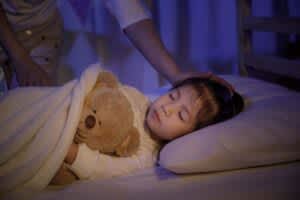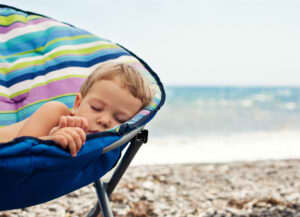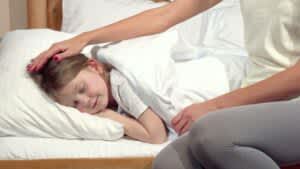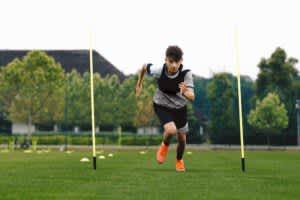In 2018, more than 71% of children aged 6 to 12 participated in some form of organized sport, and around 38% regularly played on a team. Athletics are a fun way for kids to develop friendships and physical strength. However, some children feel overwhelming pressure to excel at sports, and some teen athletes sacrifice sleep for training sessions.
Children and teenagers need adequate sleep to develop physically and mentally, and young athletes are no exception. High quality sleep is linked to better athletic performance and fewer injuries in teens and young adults. In contrast, those who do not get enough sleep are more likely to be sick or injured, and to face issues like depression and anxiety. Kids who struggle to balance school, sports, and daily life also run the risk of disrupting their natural sleep cycles.
We look at the importance of sleep for a student athlete, including the effects of sleep on athletic performance, and how parents can help kids and teens get enough rest to thrive and excel.
How Does Sleep Deprivation Affect Athletes?
While research suggests that consistent, high-quality sleep leads to better athletic performance, sleep deprivation negatively affects athletes in a variety of ways, both mentally and physically. Inadequate sleep is associated with:
- Reduced reaction time: One study showed that student athletes who slept more over the weekend reacted faster on Mondays. However, getting less sleep during the week resulted in slower reaction times on Thursday and Friday.
- Increased stress and anxiety: Many young athletes struggle with stress and anxiety that prevent them from getting enough rest. This can lead to a vicious cycle in which a lack of sleep causes anxiety, and anxiety interferes with sleep.
- Decreased mental performance: A single night without adequate sleep may decrease self-control and affect decision-making. Sleep-deprived kids and teens may struggle with focus and memory in school and on the playing field.
- Lower energy levels: Tired athletes become exhausted more quickly while training, particularly if they do not take enough time to recover between periods of exertion.
- Higher risk of injury: Sleep deprivation is strongly associated with sports-related injuries. One study found that middle and high school athletes who got less than eight hours of sleep each night were 70% more likely to be injured. Increasing training load at the same time as decreasing sleep duration can compound the risk for injury.

Do Young Athletes Require More Sleep?
The research on adult athletes suggests that those who get more sleep perform better. Adequate high-quality sleep is associated with a host of benefits, from increased accuracy and alertness to better overall mood and faster recovery times.
The link between extended sleep times and improved athletic performance is so strong, some experts suggest adult athletes sleep for 9 to 10 hours a night. This practice is called sleep banking, in which athletes sleep for a longer period of time before a night of sleep deprivation.
Like their adult counterparts, young athletes need sleep to stay healthy, academically focused, and competitive. However, all children and most teenagers generally require more sleep than adults. Longer sleep may benefit student athletes academically, with one study showing improvement in teenagers’ grades after extending their sleep duration.
Why Is Sleep So Important for Athletes?
Sleep plays a vital role in maintaining good health for both athletes and non-athletes. The body requires sleep to fight infections, organize memories, and regulate emotional processes. In children and teenagers in particular, getting enough sleep supports physical and mental health, learning, and behavioral development.
Athletes benefit from getting high-quality sleep in some specific ways. These include:
- Optimized performance: Good sleep practices are correlated with success in team sports. Sleep is associated with improved speed and accuracy.
- Improved cognitive function: Studies have demonstrated that well-rested athletes are more alert, energetic, and quick to respond to stimuli, with some reporting improved moods. In teen athletes, longer sleep is also linked to better academic performance.
- Stronger immunity: Athletes may be more susceptible to viruses during competitions and tournaments, possibly due to stress. However, studies show that individuals who get more sleep are less likely to develop infections than those who are relatively sleep deprived.
How Much Sleep Do Young Athletes Need?
The American Academy of Sleep Medicine provides nightly sleep recommendations by age, which can be helpful in determining how much sleep a young athlete might need:
| Age Group | Recommended Amount of Sleep |
|---|---|
Preschool, 3-5 years | 10-13 hours |
School-age, 6-12 years | 9-12 hours |
Teen, 13-18 years | 8-10 hours |
Preschool
Experts recommend that children aged 3 to 5 get 10 to 13 hours of sleep every 24 hours and at least 180 minutes of physical activity each day, including 60 minutes of moderate or vigorous activity. Kids in this age group are still developing the physical skills they need to play organized sports.
At this age, some children may begin to drop their daily nap. Like teens and adults, however, young children who are especially active may benefit from additional sleep. To help your preschooler get more sleep, consider implementing a 30-40 minute bedtime routine that combines physical contact like cuddling, language-based activities like storytelling or singing, and hygiene activities like brushing teeth or bathing. Avoid screen time, boisterous games and activities, and loud music.
Children who follow a regular bedtime routine are more likely to consistently sleep better. Routines have also shown to improve kids’ and parents’ moods, lower household stress levels, and lead to better learning outcomes.
School-Age
Kids aged 6 to 12 need between 9 and 12 hours of sleep each day to stay healthy and develop normally. Good sleep habits are associated with better overall health and learning outcomes. Physical activity is also associated with health benefits. However, only 24% of kids aged 6 to 17 get at least 60 minutes of physical activity a day.
Some parents report that their elementary- and middle-schoolers avoid sports due to pressure from coaches, classmates, and society at large. To combat this, it may help to encourage school-aged children to explore multiple sports and physical activities without pressuring them to specialize.
Carefully monitor the sleep habits of student athletes to ensure that they get enough rest each night. If your child is getting less than the recommended hours or struggling to fit sleep in between sports and school, talk with them about making some adjustments to their schedule.
Teen
As high school athletes progress in their education, many face increased pressure to excel academically and athletically. Some teenagers ignore crucial aspects of health like sleep and proper nutrition in favor of intense training. However, teens aged 13 to 18 should be getting 8 to 10 hours of sleep a day at minimum. Like adult athletes, teenagers who play sports may benefit from sleep banking before competitions and getting additional sleep during the week.
In addition to the demands of school and sports, technology and caffeine use can chip away at teens’ sleep time. It may help to monitor teen athletes for signs of fatigue, anxiety, or overtraining and encourage tired teenagers to extend their usual sleep periods by 30 minutes to an hour. Schedule workouts and practices during the day in a way that promotes healthy sleep at night.
Shop the Best Mattresses for KidsFactors That Influence Sleep in Youth Athletes
Every child is different, and sleep needs can vary considerably among individuals. A preschooler will have different sleep requirements from a high school student. However, there are additional factors besides age that affect how much sleep a young athlete needs:
- Type of sport: The type of sport a child or teenager plays might influence how much sleep deprivation affects their athletic performance. For example, some early studies have shown that a lack of sleep may not affect athletic performance if the sport involves short bursts of energy rather than sustained effort.
- Training and academic schedules: Many young athletes, especially those in high school, struggle to fit sleep into schedules jam-packed with training sessions, tournaments, tests, and even part-time jobs. While student athletes may get less sleep than others their age, they may actually need more due to their demanding schedules.
- Travel: Kids who travel to play sports often face additional difficulties getting enough sleep. Along with disrupted schedules, traveling athletes may deal with disrupted sleep cycles as they cross time zones.
Tips for Improving Sleep in Youth Athletes
Supporting young athletes in developing healthy habits can help them meet their full potential at school, in sports, and as they continue to grow.
- Curb technology use before bed: Although many teens spend their nights glued to a smartphone or laptop, too much screen time before bed can lead to an “on call” mentality that makes it hard to sleep. Encourage teenagers to limit or reduce their nighttime tech usage.
- Maintain consistent bedtime routines: While young children thrive on routine, older kids and teenagers can also benefit from maintaining a consistent evening routine that helps them wind down and get ready for bed.
- Communicate about scheduling: If a child is too anxious to sleep or struggles to fit the recommended amount of sleep into their schedule, it may be time to make some adjustments. It could help to talk with them about how their current schedule makes them feel. Avoid “overbooking” practices and lessons, and consider ways to scale back obligations if they continue to have difficulty getting enough rest.

Frequently Asked Questions About Sleep in Youth Athletes
Lack of sleep has been tied to slower reaction times, reduced accuracy, and less effective decision-making during games. Athletes who get poor quality sleep become fatigued quickly and may be more prone to injury. In contrast, getting more sleep is associated with increased athletic success and better recovery.
The body needs sleep to prevent inflammation, repair cells and tissue, and recover from strenuous exercise. Sleep deprivation may also cause metabolic problems that are especially troublesome for athletes. For example, chronic sleep loss is associated with unhealthy food cravings and lower levels of human growth hormone. All of these issues can lead to poor athletic performance and health challenges.
There is limited research on if and how sleep deprivation affects young athletes of different genders. In the general population, adult women and people assigned female at birth are more likely to have difficulty falling asleep and staying asleep. However, a study in Olympic athletes found that members of a men’s team had more trouble falling asleep than members of the women’s team.
Teen athletes should be getting at least the recommended 8 to 10 hours of sleep every night, and possibly more. Adolescents who play sports must balance academics, competitions, and training, often struggling to fit all three into highly variable schedules. Some studies show that increasing sleep in young athletes may result in better grades and improved athletic performance.
References
The Sleep Doctor Forum: Real Experiences, Real Connections
Continue the discussion on the Sleep Doctor Forum. Connect with experts and fellow forum members on CPAP, sleep apnea, and all things sleep. A priceless resource that’s free to join.





































